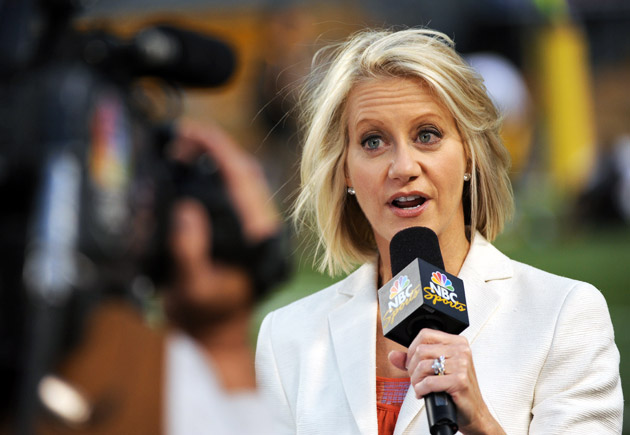The Babecaster
January 8, 2018

THE growing number of female sports reporters is said to be a sign of women’s progress:
Over the past few years, women in the sports world have made progress toward equality in the workplace. But for every step taken forward, for those in the field, it can seem to be countered quickly with a reminder of the work still left to be done.
In April 2016, ESPN’s Around The Horn featured an all-female panel for the first time in the show’s history, consisting of Kate Fagan, Jemele Hill, Jackie MacMullan and Sarah Spain. The panel marked a historic moment that came just a week after the program’s 3,000th episode.
This isn’t progress. In fact, it is the opposite: a sign of regression.
Ideological poses aside, women like virility. Even more importantly, they depend on virility, even today. But men can’t thrive unless they have avenues for male bonding. Sports were the last holdout against destructive egalitarianism.
No woman has ever played professional football. The number of women who have ever wanted to play professional football is infinitesimally small. By what authority then does any woman belong in a job reporting from a football field when there are plenty of men who long for such jobs?
My husband calls female sports reporters “babecasters.” I apologize for his outrageous insensitivity, but a search on the Internet reveals that many men, unlike my husband, have prurient attitudes toward women sports journalists. If they like them at all, it is not because of their skill. Obviously the networks appeal to this prurience by choosing highly attractive women.
Last fall, Cam Newton, a Panthers quarterback, laughed when he was interviewed by a female sports journalist. He was honest and briefly commented on the oddity of a woman using football lingo. He was subsequently punished.
It’s sad that women are so insecure and miseducated in the wake of feminism that they think the point is that they are somehow inferior. Women rule the world by virtue of their dominance in the most important sphere of life: family and social relations. Why can’t they let men have something to themselves — some arena where they can believe that being a man is not the crime the modern world says it is? True femininity is the refusal to dominate men, the gracious and deferential approval of masculinity. Most of the traditional restrictions on women in male spheres were aimed at correcting the imbalance that nature creates: a void in male identity in the face of woman’s command over life itself.
— Comments —
Daniel T. writes:
I’ve mentioned to family members the cognitive dissonance I experience when I listen to female play-by-play announcers. Female sideline reporters I can easily dismiss since that’s just incidental input, rarely of consequence but just relating comments made by players or coaches. But it’s jarring to listen to a feminine voice describing the action. I think ESPN’s Beth Mowins is actually very good – her content isn’t overly technical as that of so many male announcers and I can’t remember her going wildly off-track with silly banter, again as her male counterparts do. But to my ears the feminine voice just doesn’t belong there. I’m criticized (politely) for this view, but it’s natural and honest; how is this different from someone being physically attracted to women and not men? I haven’t been challenged on that count.
Alec H. writes:
“[M]any men … have prurient attitudes toward women sports journalists.”
Laura writes:
Sexual assault on the sidelines.
Kyle writes:
“There are people in Europe who, confounding together the different characteristics of the sexes, would make of man and woman beings not only equal but alike. They would give to both the same functions, impose on both the same duties, and grant to both the same rights; they would mix them in all things – their occupations, their pleasures, their business. It may readily be conceived, that by thus attempting to make one sex equal to the other, both are degraded; and from so preposterous a medley of the works of nature nothing could ever result but weak men and disorderly women.”
— Alexis Tocqueville (1835). Democracy in America. (Chapter XII: How the Americans Understand the Equality of the Sexes).
